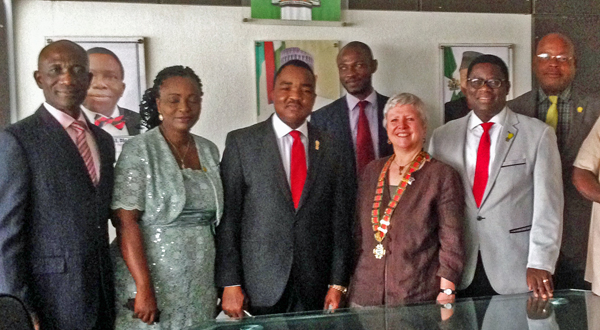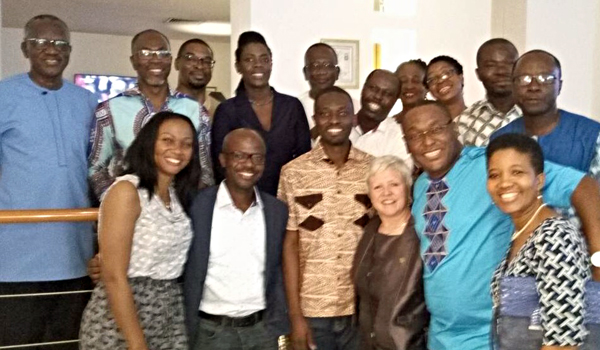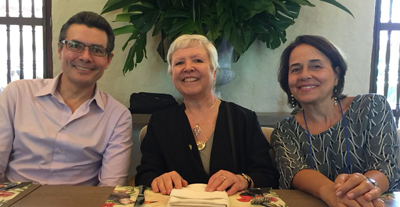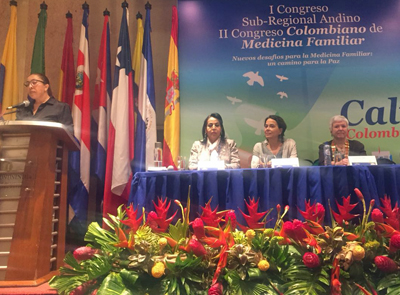From the President – May 2018
 Photo: Amanda Howe with the Presidents of the member organizations of WONCA IberoAmericana
Español français
Photo: Amanda Howe with the Presidents of the member organizations of WONCA IberoAmericana
Español français
I am writing this from an intense energetic conference in Nigeria, hosted by one of our member organisations - the Association of General and Private Medical Practitioners of Nigeria (AGPMPN). This is my first visit to West Africa during my Presidency, having managed countries in North, South and East Africa already, and I have been to Ghana and Nigeria during this trip. I was very well received, and am grateful for Dr Frank Odafen and the AGPMPN for their invitation and hosting of the trip.
 Photo: Amanda with Dr Frank Odafen (to her right), and colleagues
from the Association of General and Private Medical Practitioners of
Nigeria, at the Ministry of Health in Abuija.
Photo: Amanda with Dr Frank Odafen (to her right), and colleagues
from the Association of General and Private Medical Practitioners of
Nigeria, at the Ministry of Health in Abuija.
Frank fixed some very high level visits to ministries, state and national representatives, including the wife of the President, who is a champion for maternal and child health issues – the visits were part of a clear advocacy campaign for the association, working closely with other WONCA Member Organizations with whom there is cross-representation.
I made Africa a priority of my term of office, because it has “24% of the global burden of disease, 3% of the workforce, and 1% of the global health expenditure”, and because of the many challenges the continent continues to face. Nigeria is a rich country by African standards, but – as colleagues repeatedly cited – it has high rates of maternal mortality, child malnutrition, and rapidly rising rates of non-communicable diseases (NCDs), as well as threats such as lassa fever. Government legislation has not yet translated into significant provision, with out of pocket expenses counting for almost 80% of the health spend, and less than 5% of the population covered by any insurance. Fragmented provision across public, private and faith based organisations, with very weak rural coverage and generally poor governance and infrastructure adds to a picture of a mismatch between availability (many providers, plenty of doctors) and effective systematic care.
 Photo: Amanda in Ghana with leaders of Family Medicine in Ghana - the Executives of Society of Family Physicians of Ghana
Photo: Amanda in Ghana with leaders of Family Medicine in Ghana - the Executives of Society of Family Physicians of Ghana
The West Africa family doctors sit in the middle of this, with opportunities for public-private partnership but no deal on the table as yet. It will take a strong and proactive push from the family doctor side to help the government to use them to build better community based primary care that delivers full universal health coverage. They are already using upskilling within their own community, and looking at group practice models to upscale, but it will be a huge step to see a national health system across Nigeria. Where government needs help, it is important that we provide the vision and the model which may work for the people and for us. I saw colleagues trying to develop these kinds of policies, and speaking ‘truth to power’ – and I was moved, as always, to see the efforts and passion and hard work of all involved. I hope it makes a difference, and am confident that WONCA’s profile is helpful in these kinds of developments.
The other equally intense and impressive overseas experience was the IberoAmericana Cumbre and conference in Colombia. Talking of political effectiveness, this was an amazing model for two key reasons: first, six Ministers from across the region attended, spoke, and signed a Declaration committing themselves to working to increase family medicine and to engage other Ministers in the region! (
Ministerial declaration in Spanish).
 Photo: Amanda (centre) with the Colombian Minister of Health (left) and WONCA Iberoamericana-CIMF region president, Inez Padula (right)
Photo: Amanda (centre) with the Colombian Minister of Health (left) and WONCA Iberoamericana-CIMF region president, Inez Padula (right)
Also, the region has produced a model of working across all the countries on agreed work programmes, reporting back into the Cumbre and making further commitments for the next stage. The work was excellent intellectually, was engaging a large number of people including some of the young doctors, and also providing the basis for conference presentations and new knowledge for the wider family doctor community. I intend to ask the regional President Dr Inez Padula to discuss with WONCA Executive how this has built up, as it seems a really good way of working. Well done to all, and thanks particularly to the Colombia team and their leads Dora Bernal and Liliana Arias Castillo for their hard work and personal hospitality.

Photo: Dora Bernal speaks watched by Liliana Arias-Castillo, Inez Padula and Amanda Howe
And then there is WHO and matters related – extra meetings and online consultations are burgeoning as they start the run-in to Almaty 40th celebrations , and to the World Health Assembly in May. I shall be in Geneva twice in a month, and I thank Viviana Martinez-Bianchi for her endless work as our WHO liaison person on WONCA Executive; also others who are responding to representation requests.
We also have World Family Doctor Day on May 19 – we shall celebrate and report your examples, and I shall follow this up in June (
more on World Family Doctor Day). You deserve recognition – so whether it’s a project report, a picture or a personal account, look forward to sharing the wonderful work you are doing as family doctors!
And HAPPY WORLD FAMILY DOCTOR DAY!
Amanda Howe